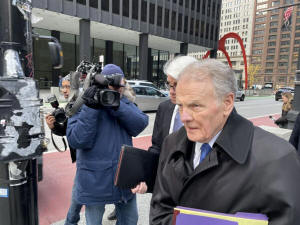Madigan doesn't want professor to testify about Chicago's political
machine
 Send a link to a friend
Send a link to a friend
 [July 13, 2024]
By Brett Rowland | The Center Square [July 13, 2024]
By Brett Rowland | The Center Square
(The Center Square) – Former Illinois House Speaker Michael Madigan
doesn't want a professor to testify about Chicago's political machine at
his upcoming corruption trial.
Madigan's defense team said University of Illinois Chicago professor
Dick Simpson's testimony would be "unreliable, irrelevant, and highly
prejudicial."
Prosecutors want to call Simpson to the stand to explain how Chicago
politics and government work. That includes the workings of Ward
organizations, Chicago's political machine and patronage hiring.
Defense attorneys said Simpson's testimony isn't needed and, if allowed,
could turn the jury against Madigan.
"Even without Professor Simpson's testimony, Madigan faces a significant
challenge to receive a fair trial due to the constant public commentary
that assumes his guilt before one piece of evidence has been entered at
trial," Madigan's defense attorneys wrote in a motion to exclude the
testimony. "This publicity did not just start with this case, it has
been in the works for decades."
Prosecutors also want to call former Chicago Alderperson Michele Smith
to testify about the operation of the Chicago City Council, its Zoning
Committee and the role of Chicago Democratic Committeemen. Defense
attorneys objected to Smith's testimony as well, saying her personal
experience doesn't make her an expert.
A judge excluded Simpson's testimony from a 2023 corruption trail
focused on four former ComEd executives and lobbyists accused of a
scheme to reward Madigan in exchange for help with legislation in
Springfield that would affect the electric utility company. In that
case, Judge Harry Leinenweber said the jury didn't need an explanation
and that a detailed history of the corruption of the Chicago political
machine could prejudice the jury. A jury convicted the four ComEd
executives and lobbyists in May 2023, but defense attorneys may seek a
new trial after a Supreme Court ruling narrowed the federal bribery
statute. Those defendants haven't been sentenced.
[to top of second column]
|

Former Illinois House Speaker Michael Madigan walks out of the
Everett M. Dirksen U.S. Courthouse in Chicago on Wednesday, Jan. 3,
2024. - By Brett Rowland | The Center Square

Defense attorneys also said Simpson endorsed Madigan's opponent in a
2016 primary election.
Madigan served in the Illinois House from 1971 to 2021, as speaker
from 1983 to 1995 and again from 1997 to 2021. That made him one of
the state's most powerful politicians, especially given his role as
head of the Democratic party in the state. He faces 23 counts of
racketeering, bribery, and official misconduct as part of a federal
indictment. Madigan has pleaded not guilty.
Madigan was initially charged along with convicted former lawmaker
and lobbyist Michael McClain in March 2022 with 22 counts of
racketeering and bribery for his alleged improper dealings with the
state's largest utility, ComEd. Prosecutors further alleged that he
used his political power to unlawfully steer business to his private
law firm, Madigan & Getzendanner. In October 2022, prosecutors filed
a superseding indictment that charged Madigan and McClain with
conspiracy related to an alleged corruption scheme involving AT&T
Illinois.
[© 2024 Thomson Reuters. All rights
reserved.]This material
may not be published, broadcast, rewritten or redistributed.
Thompson Reuters is solely responsible for this content.
 |